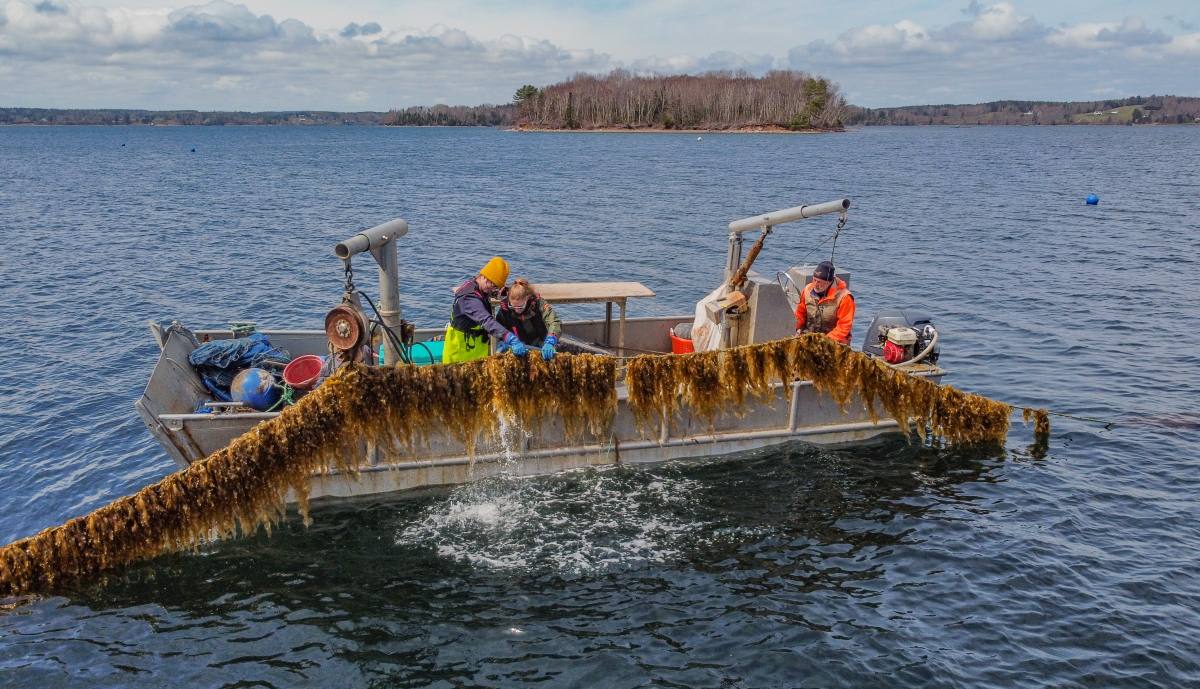Support strong Canadian climate journalism for 2025
While kelp is gaining popularity as a climate-friendly superfood, a new analysis is shining light on the economic opportunity it could present for one of Canada’s smallest provinces.
On Wednesday, environmental charity Ecology Action Centre (EAC) released its Roadmap for Nova Scotia Kelp Farming. The group says the province is “well positioned to gain a significant share of the $200-million North American regional market for products containing kelp and kelp-based ingredients.” That is, if the provincial government makes leaps to support the industry by making it easier for people to start kelp farming and bolstering opportunities for kelp sales in Nova Scotia and beyond.
As of now, there are a few small-scale kelp farms in the province, which means there is immense potential for kelp farming to be developed in a way that directly gives back to coastal communities, said Shannon Arnold, EAC’s marine program co-ordinator. As of now, it can take several years for farmers to get permits, she said, which shows the need for a regulatory process that specifically considers the low-risk impact of small kelp operations.
“There are interested large players from other jurisdictions who are looking at Nova Scotia. You could come and just do a massive kelp farm and boom,” she said.
“But we are hoping that with some regulatory shifts and policy changes, while still being rigorous in terms of ecosystem impacts, [it can be] not so onerous, so people can get on the water and start trying and testing and getting involved.”

The analysis for the roadmap was commissioned by EAC and performed by Changing Tastes, a food strategy consultancy company. It found that by 2030, the province could grow its contribution to the kelp sector to over 16.5 million kilograms while tripling the farmed acreage. To put that in perspective, Atlantic Sea Farms — which produces the lion’s share of kelp in Maine, the hub of kelp farming in the United States — harvested one million pounds, which is around 453,000 kilos, of kelp in 2022.
At the launch of the report on Tuesday, Nova Scotia Minister of Economic Development Susan Corkum-Greek said developing the kelp industry could be a “watershed moment” for the province. Part of the analysis provided a roadmap on investing in processing kelp within Nova Scotia’s borders, rather than exporting it. Kelp can be processed to be shelf-stable, which makes it easier to transport.
“Too many of our natural resources-based products from the ocean … have got shipped away. And most of the added value was added elsewhere,” said Corkum-Greek. “So of course, we see a lot of opportunity here. We want to maximize that value.”
While kelp is gaining in popularity, the government could also work with the industry to expand the use of kelp in food and personal care products, the report says. Kelp is a nutritional, plant-based food that requires no land, freshwater or fertilizer. This appeals to vegan chef and nutritionist Pamela Leonforde, who was at Tuesday’s event. She recently launched a small plant-based business called Canaan’s Plant Based Alternatives. Currently, she uses a lot of sea moss in her products but says she hopes to expand to use more kelp and would love to take advantage of a local market.

Along with commissioning the report, EAC has a seaweed farming and training centre where it teaches people how to start farming kelp. It’s hosted at Indian Point Marine Farms, where Peter Darnell has farmed scallops and mussels since the 1980s. Now, Darnell does some hobby farming and is a partner with the training centre. After decades of farming in the sea, he said he is amazed at how accessible kelp farming is.
“The hatchery part, I'm not downplaying that being easy, I think that's difficult, but if you're successful there, you just put it out,” he said, referencing cultivating kelp seedlings.
“It's not much of a job to put it out. Once you put it out, you don't have to do anything.”

There were fishers interested in kelp, people interested in kelp farming, experienced farmers and more at the launch of the report. Arnold hopes a shift in the industry helps them all take advantage of kelp’s opportunities.
“We are getting left behind by our neighbours to the south who are moving quickly to capitalize on the demand for kelp,” she said.
“Nova Scotia needs fit-for-purpose regulations that protect marine ecosystems and get folks on the water faster.”






Comments
Is this a new idea to the Maritimes? Sounds like there are already commercial operations underway on the New Brunswick Fundy shore, but perhaps it's new to Nova Scotia and the Halifax EAC.
https://www.cbc.ca/news/canada/new-brunswick/seafood-company-algae-1.46…